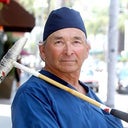Septoplasty and Rhinoplasty Using Local Anesthesia?
I need a Septoplasty due to a broken nose. I am considering getting a Rhinoplasty at the same time too. I have a HUGE fear of being "put under". I'm also emetophobic as well and general anesthesia frightens me since I've had past surgeries and thrown up for about 2 days after. Can I get this done with local anesthesia? I really hope so because I don't think I will ever get this fixed if anyone won't do it that way.













